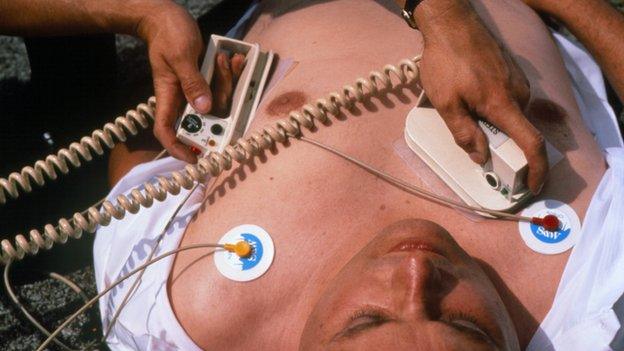Health check for the NHS - how well is the service performing?
- Published

International comparisons are notoriously difficult with healthcare - different models and variable data quality can complicate the task. But the Nuffield Trust and the Health Foundation have had a bash at it, comparing the NHS with some other systems on a range of care outcomes.
Nuffield's Nigel Edwards acknowledges that comparisons should be handled with care but is prepared to conclude that the UK "can and should do better".
The report pulls together OECD (Organisation for Economic Co-operation and Development) data which are dispersed around assorted health-related publications. All the conclusions relate to the UK as a whole.
On mortality rates from heart attacks the UK lags behind five other countries used as comparisons, including New Zealand and Sweden
With common cancers the UK is also trailing a group of 14 other advanced economies
Preventable hospital admissions for chronic respiratory conditions like asthma see the UK at "relatively high " levels compared to others
The brighter news for the NHS is that performance on cancer screening is better than many others in the group, ditto cervical screening rates.
High flu vaccination uptake and lower antibiotic prescribing rates are also seen as positives for the UK.
So what are we to make of it all?
'Respectable'
There is a fair amount of "on the one hand, and on the other" in the report. There is no indicator on which the UK does worse than other countries and where performance is deteriorating, say the authors.
But on half the 27 chosen indicators the UK outcomes are inferior to most of the others.
The clearest conclusion is that, given the amount which is spent on health in the UK, the overall performance of the NHS is respectable.
The report notes that health spending as a proportion of national income has been one of the lowest of all the comparator countries in the last few years.
So if we are not spending as much as the others, perhaps its not surprising that many of the results are mediocre.
This conclusion tallies with recent research by the Economist Intelligence Unit which, in its own international analysis, argues that the UK system holds up well against others on cost-efficiency but the number of doctors, nurses and hospital beds is lower than for many advanced nations.
The Commonwealth Fund found that the NHS was the most efficient of any of the healthcare systems it had surveyed.
What all these organisations imply is that the NHS seems to be doing as well as can be expected given the investment made by the taxpayer.
Looking ahead Nuffield and the Health Foundation have a stark conclusion for the government, given the limited extra funding relative to anticipated demand which has been promised.
They warn: "If the lessons are not learned or savings cannot be delivered, the Secretary of State for Health may find that international comparisons are used to highlight an increasing gap between the UK and other countries."
- Published3 July 2015
